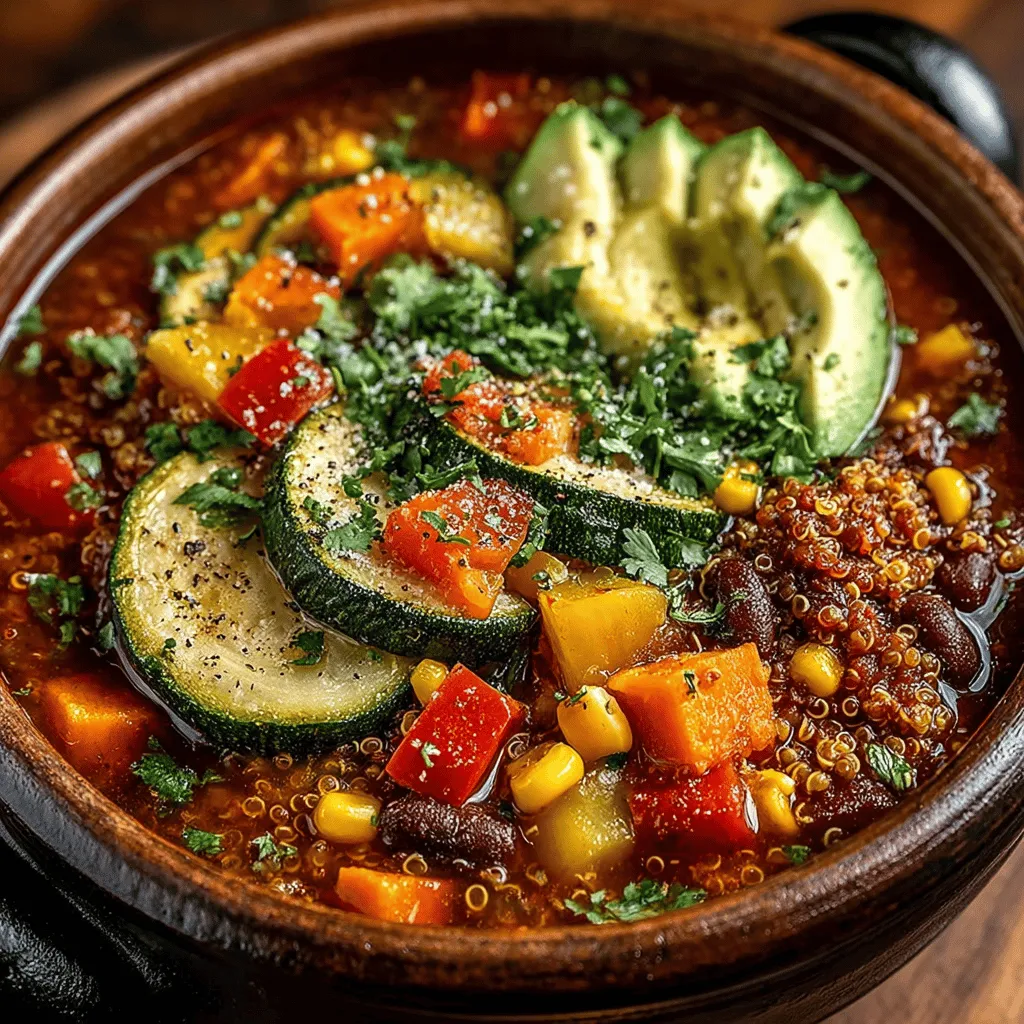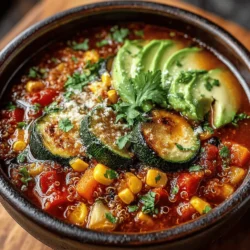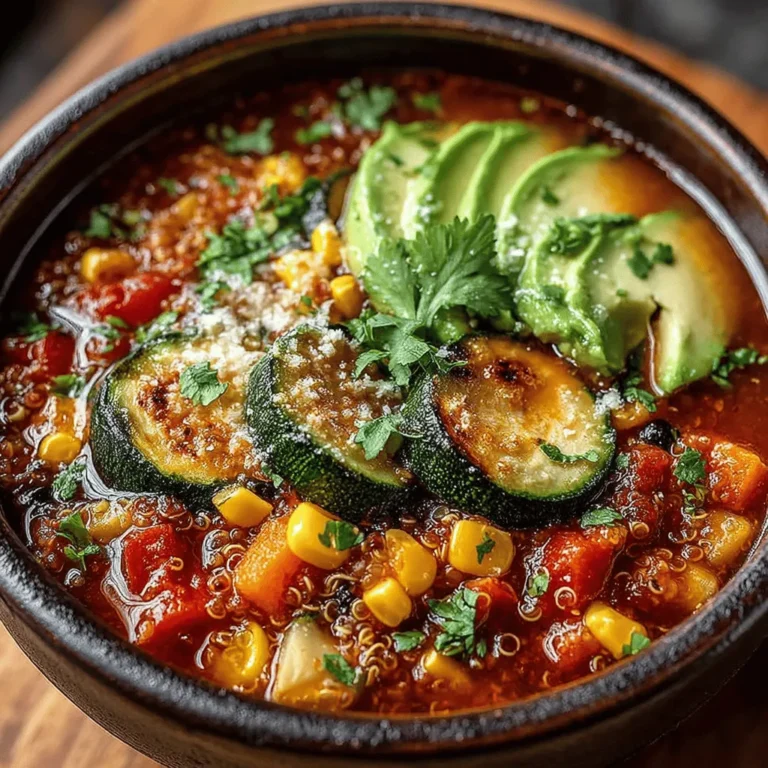Hearty Harvest Slow Cooker Vegetable and Quinoa Chili
As the seasons transition and the air grows crisp, there’s nothing quite like a warm, nourishing bowl of chili to soothe the soul. Enter the Hearty Harvest Slow Cooker Vegetable and Quinoa Chili, a delectable plant-based dish that not only satisfies your hunger but also fuels your body with wholesome ingredients. This recipe is designed for ease and convenience, making it perfect for busy weeknights or cozy gatherings with family and friends.
The Essence of Hearty Harvest Chili
What sets this chili apart is its rich tapestry of flavors and textures, achieved through a medley of fresh vegetables, hearty beans, and the nutrient powerhouse, quinoa. Each bowl is a vibrant celebration of autumn harvest, bringing together the earthiness of root vegetables and the warmth of spices. This dish is more than just a meal; it’s a nourishing experience that caters to a variety of dietary preferences, making it an ideal choice for vegans, vegetarians, and anyone looking to incorporate more plant-based meals into their diet.
Health Benefits of Quinoa and Vegetables
Quinoa, often hailed as a superfood, is a complete protein, meaning it contains all nine essential amino acids that our bodies can’t produce on their own. This makes it an excellent choice for those following a plant-based diet, providing the necessary building blocks for muscle repair and maintenance. In addition to its protein content, quinoa is rich in fiber, magnesium, and antioxidants, contributing to overall health and well-being.
The variety of vegetables in this chili not only adds vibrant color but also a wealth of nutrients. From bell peppers and zucchini to sweet corn and tomatoes, each ingredient brings its unique health benefits. These vegetables are loaded with vitamins, minerals, and fiber, supporting digestive health and boosting the immune system. Furthermore, they enhance the flavor profile of the chili, offering a delightful contrast to the hearty beans and grains.
The Allure of Slow Cooking
One of the standout features of this Hearty Harvest Chili is the slow cooking method. Utilizing a slow cooker allows the ingredients to meld together beautifully, creating a depth of flavor that’s hard to achieve with quicker cooking methods. The low and slow approach ensures that the beans soften perfectly, and the spices infuse throughout, resulting in a dish that’s warm, comforting, and full of character. Plus, the ease of preparation means you can set it and forget it, freeing up your time for other activities.
Understanding the Ingredients
To create the perfect Hearty Harvest Slow Cooker Vegetable and Quinoa Chili, it’s essential to understand the key ingredients that contribute to its flavor and nutritional profile.
Benefits of Quinoa
Quinoa is a versatile grain that can easily adapt to various recipes, soaking up flavors while maintaining its unique texture. Its high protein content makes it an excellent choice for a filling meal, while its gluten-free nature makes it suitable for those with gluten sensitivities. Quinoa also offers a variety of essential nutrients, including B vitamins, iron, and zinc, making it a staple in any health-conscious kitchen.
The Role of Beans
Beans are a cornerstone of any chili recipe, providing both protein and fiber. In this recipe, black beans and kidney beans are featured prominently. Black beans are known for their rich flavor and creamy texture, while kidney beans add a hearty bite. Together, they create a satisfying base for the chili, helping to keep you full and energized throughout the day. The fiber content in beans also supports digestive health, making this dish not only delicious but also beneficial for your gut.
The Importance of Fresh Vegetables
Fresh vegetables are the stars of this chili, contributing not only flavor but also a delightful array of textures. Onions and garlic form the aromatic backbone, while bell peppers and zucchini add sweetness and crunch. Tomatoes bring acidity and brightness, and corn adds a touch of sweetness that balances the spice. Using seasonal produce ensures you get the freshest flavors and the most nutrients, making each bite a celebration of nature’s bounty.
Spices and Seasonings
The flavor of this chili is elevated by a carefully chosen blend of spices. Chili powder, cumin, and smoked paprika work together to create a rich, warming profile that dances on the palate. Chili powder adds a depth of heat without overwhelming the dish, while cumin introduces a warm, earthy note. Smoked paprika contributes a subtle smokiness that enhances the chili’s complexity. Together, these spices create a comforting aroma that fills your kitchen, inviting everyone to the table.
Step-by-Step Guide to Preparing the Chili
Preparing the Hearty Harvest Slow Cooker Vegetable and Quinoa Chili is a straightforward process that can be broken down into several key steps to ensure the best results.
Prepping the Quinoa
Before diving into the chili preparation, it’s crucial to give the quinoa some attention. Rinsing quinoa is an essential step that helps remove its natural coating, known as saponin, which can impart a bitter taste. To rinse quinoa, place it in a fine-mesh strainer and run it under cold water for a few minutes, stirring gently with your hands to ensure all grains are rinsed thoroughly.
Once rinsed, you can proceed to cook the quinoa. For this recipe, it will be added directly to the slow cooker, where it will absorb the flavors of the chili while cooking. Achieving the perfect texture is important; you want the quinoa to be fluffy and tender without becoming mushy. The slow cooking process helps achieve this, as it allows the quinoa to cook gently alongside the other ingredients.
Sautéing the Aromatics
Next, sautéing the aromatics—onions and garlic—is an important step that enhances the flavor development of your chili. Heat a splash of olive oil in a skillet over medium heat and add the chopped onions. Sauté them for about 5-7 minutes, or until they become translucent and tender. This process helps to release their natural sweetness, which builds a solid foundation for the chili.
Once the onions are ready, add minced garlic and cook for an additional minute. You’ll know the garlic is ready when it becomes fragrant but be careful not to burn it, as that can impart a bitter flavor. After sautéing, transfer the mixture to the slow cooker, where it will mingle with the other ingredients and deepen the overall flavor of the dish.
Combining Ingredients in the Slow Cooker
Now comes the fun part—combining all the ingredients in the slow cooker. Layering the ingredients in a specific order can affect the cooking process and flavor distribution. Start by adding the sautéed onion and garlic mixture to the slow cooker, followed by the rinsed quinoa. Next, add the black and kidney beans, ensuring they are drained and rinsed to remove excess sodium.
After that, it’s time to add the fresh vegetables, including diced bell peppers, zucchini, and corn, followed by the canned tomatoes. Finally, sprinkle in the spices—chili powder, cumin, and smoked paprika—ensuring everything is well-distributed. For a little extra kick, feel free to add diced jalapeños or a dash of cayenne pepper at this stage, depending on your heat preference.
With all the ingredients in the slow cooker, add vegetable broth to ensure everything is submerged and cooking evenly. Stir gently to combine, then set your slow cooker to low for 6-8 hours or high for 3-4 hours, allowing the ingredients to meld together into a hearty, flavorful chili.
This step-by-step preparation not only sets the stage for a delicious meal but also makes it easy to enjoy the process of cooking, turning meal prep into a delightful experience. As the chili simmers away, the enticing aroma will fill your home, inviting everyone to gather around the table for a comforting meal that celebrates the bounty of the harvest.

Tips for Achieving a Balanced Flavor Profile
Creating a flavorful chili requires attention to detail and the right combination of ingredients. Here are some essential tips to ensure your Hearty Harvest Slow Cooker Vegetable and Quinoa Chili has a balanced flavor profile:
1. Layering Flavors: Start by sautéing your onions and garlic before adding them to the slow cooker. This enhances their sweetness and adds depth to the base of your chili.
2. Spices and Seasoning: Use a combination of spices such as cumin, chili powder, and smoked paprika to elevate the flavor. Consider adding a pinch of cinnamon or cocoa powder for a unique twist that complements the heat of the chili.
3. Acidity Balance: Incorporating a splash of vinegar or a squeeze of lime juice before serving can brighten the flavors and add a refreshing contrast to the richness of the beans and quinoa.
4. Salt Adjustment: Be mindful of your salt levels. Start with a smaller amount and adjust towards the end of the cooking process. This allows you to taste and balance the flavors as they develop.
5. Fresh Herbs: Adding fresh herbs like cilantro or parsley at the end of cooking can provide a burst of freshness that enhances the overall taste.
Cooking Process
Explanation of Slow Cooking: How It Affects Flavor and Texture
Slow cooking is a time-honored technique that allows flavors to meld beautifully over an extended period. In the case of our vegetable and quinoa chili, the slow cooker helps break down the vegetables, allowing their natural sweetness to emerge while creating a rich and satisfying broth.
The low and slow cooking method also enhances the texture of the quinoa, making it fluffy while absorbing the spices and liquids. The result is a hearty dish where each bite is a harmonious blend of flavor and texture.
Adjusting Cooking Times for Different Slow Cooker Models
Not all slow cookers are created equal. Some may cook faster than others, so it’s essential to monitor your chili closely. On average, this chili should cook on low for about 6-8 hours or on high for 3-4 hours. If you’re using a newer model with a more efficient heating element, you may find that your chili is ready sooner, so check for doneness periodically.
Checking for Doneness
Signs That the Chili Is Ready to Serve
Determining when your chili is ready involves a few simple checks. Look for the following signs:
– Vegetable Tenderness: The vegetables should be soft but not mushy. Carrots and peppers should retain some structure, and the beans should be fully cooked.
– Quinoa Appearance: The quinoa should be fluffy and not clumped together. It should have absorbed most of the liquid while remaining distinct.
– Flavor Development: Taste the chili towards the end of cooking. It should be well-seasoned, with a balanced flavor that highlights the spices without overwhelming the palate.
Techniques to Adjust Texture and Seasoning Effectively
If you find that your chili is too thick, you can easily adjust the texture by adding a little vegetable broth or water. If it’s too thin, allow it to cook uncovered for the last 30 minutes to let some liquid evaporate.
For seasoning adjustments, start with small amounts. If the chili needs more spice, consider adding a pinch of cayenne pepper or more chili powder. For salt, a small sprinkle of kosher salt can enhance the overall flavor without overpowering it.
Serving Suggestions and Garnishes
Ideas for Garnishing: Fresh Cilantro, Avocado, and Yogurt/Sour Cream
Garnishes can take your Hearty Harvest Chili to the next level. Here are some suggestions:
– Fresh Cilantro: Chopped fresh cilantro adds a burst of flavor and freshness.
– Avocado: Diced avocado provides creaminess that balances the spices.
– Yogurt or Sour Cream: A dollop of yogurt or sour cream can add a cooling effect against the heat of the chili.
Pairing Options: Ideal Side Dishes or Accompaniments
For a complete meal, consider pairing your chili with:
– Cornbread: A slice of sweet cornbread complements the spiciness of the chili beautifully.
– Rice: Serving the chili over brown rice or quinoa adds heartiness and helps soak up the flavors.
– Salad: A side salad with fresh greens can provide a refreshing contrast to the warm chili.
Suggestions for Leftovers: Storage Tips and Reheating Methods
If you have leftovers, they can be stored in an airtight container in the refrigerator for up to five days. To freeze, portion the chili into freezer-safe containers and store for up to three months.
When reheating, thaw in the refrigerator overnight if frozen, then reheat on the stovetop over low heat, adding a splash of broth or water if necessary to prevent drying out. Alternatively, you can microwave individual portions, stirring halfway through to ensure even heating.
Nutritional Information and Health Benefits
Breakdown of Calories and Macronutrients Per Serving
This Hearty Harvest Vegetable and Quinoa Chili is not only delicious but also nutritious. Each serving (approximately 1 cup) contains:
– Calories: 250
– Protein: 10 grams
– Carbohydrates: 40 grams
– Fat: 5 grams
– Fiber: 12 grams
The high fiber content comes from the beans and quinoa, contributing to a feeling of fullness and aiding digestion, while the vegetables provide essential vitamins and minerals.
Discussion on the Benefits of a Plant-Based Diet for Overall Health
Incorporating more plant-based meals, like this chili, into your diet can have significant health benefits. A plant-based diet is associated with lower risks of chronic diseases, including heart disease, diabetes, and certain cancers. The variety of vegetables, legumes, and grains in this recipe ensures you receive a broad spectrum of nutrients.
How This Recipe Fits Into Various Dietary Lifestyles (Vegan, Gluten-Free, etc.)
This Hearty Harvest Chili is inherently vegan and gluten-free, making it suitable for a variety of dietary preferences. The use of quinoa instead of traditional grains also makes it a great choice for those looking to reduce their gluten intake. Moreover, the recipe can easily be adapted for those following a low-carb diet by reducing the amount of quinoa or substituting it with cauliflower rice.
Conclusion: Enjoying Hearty Harvest Chili
In summary, the Hearty Harvest Slow Cooker Vegetable and Quinoa Chili is not only easy to prepare but also packed with flavors, nutrients, and health benefits. Its versatility allows you to experiment with various ingredients, and the slow cooking method ensures that the flavors meld beautifully, resulting in a comforting bowl of chili that everyone will love.
Don’t hesitate to make this recipe your own by adding your favorite vegetables or spices. Share your experiences and adaptations—whether it’s a new ingredient you tried or a different garnish that elevated the dish. Enjoy the warmth and nourishment of this hearty chili, and make it a staple in your meal rotation!


